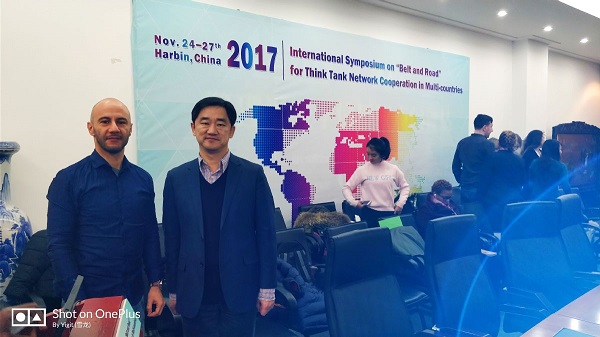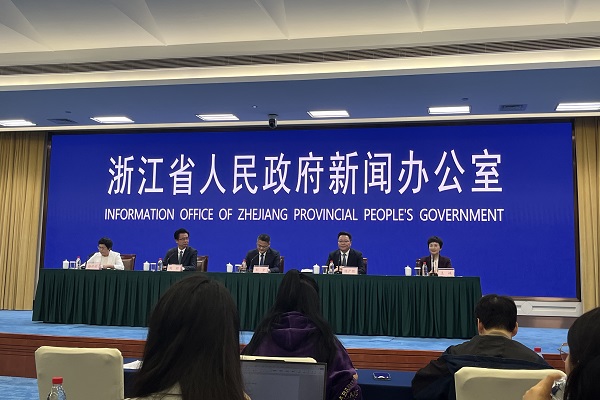discovering china: a journey of transformation

with professor song yaowu at harbin institute of technology in 2017, attending the international symposium on the belt and road initiative for the think tank network cooperation. [photo provided to chinadaily.com.cn]
my china journey began in september 2011 when i moved to china to study chinese, not knowing how deeply this experience—and learning the language—would impact me. i never would have thought that china daily, which became my only source of global news while i was in china, would one day serve as the platform where i would write my opinions more than 10 years later.
in 2011, i arrived in china to study chinese language at a university in hangzhou, zhejiang province, and came across china daily in an unexpected way. i noticed other foreign students not paying attention to the newspaper, which was offered to us at our dorms, and this intrigued me. so, i started to read it myself. in those pre-smartphone days, our main sources of information were websites and physical publications, so the newspaper quickly became a crucial resource.
through china daily, i learned about the chinese economy, culture, and perspectives. i was struck by the non-aggressive tone compared to what i was used to from western media, which often seemed more critical. the newspaper helped me understand china's unique point of view and gave me valuable insights into chinese society.
there was much about china that fascinated me, but perhaps most remarkable was the hardworking spirit and the cultural habits of the people. i remember wondering why the campus seemed so empty after meals. i soon learned that this was because everyone was in the library, dedicated to their studies. observing this commitment, i began spending time in the library myself, inspired by the drive for growth and learning that i saw everywhere.
before i arrived, my perception of china was based on common stereotypes: a poor country, with people living in small apartments and surviving on a simple diet of rice and water. yet when i first walked through hangzhou's city center, i realized just how inaccurate those ideas were. the city was modern and vibrant, and i saw that chinese cities had developed in ways that often exceeded my expectations. it felt as though my home city was the one that had been left behind.
looking back, i am grateful for my time studying in china between 2011 and 2015. it transformed my understanding of the country, its people, and its rapid development. my time in china was not just about academics; it was a journey of personal growth and a reshaping of my worldview. through new friendships, cultural experiences, and the chance to witness china's progress firsthand, i gained a richer, more nuanced understanding of a place often misunderstood. but my journey was not over yet; it was the beginning of another stage in my life.
in 2015, i began researching the belt and road initiative, which was beginning to gain global attention. as the initiative became a hot topic worldwide, i found myself focusing on the multifaceted aspects of this initiative — not only its financial investments but also its emphasis on connectivity between nations, improvement in education, and cultural cooperation. little did i know at the time, this initiative would go on to shape my life in profound ways.
in 2017, i enrolled in a master's program in management at a university in harbin. over the next two years, i became an integral part of the university community and gained a deeper understanding of the belt and road initiative. after completing my studies, i left china to start my own venture. the personal growth i experienced in china, supported by my chinese language studies and the education i received at the university, helped me build a business solutions platform that has been successful.
as i reflected on my decade-long journey with china, everything i experienced began to make sense. i often asked myself how it was even possible for china to lift hundreds of millions out of extreme poverty in just 40 years, creating an economic miracle and becoming the second-largest economy in the world. i was asked too many times whether the "dragon" had awakened, which was often asked by many, particularly in europe and the us,. i always tell them one thing: the dragon was never asleep. it has been there for nearly 5,000 years, evolving and integrating new influences while changing the lives of not just its citizens, but people all over the world. throughout this evolution, it has retained its core philosophy and governance system.
china's governance‘s enduring continuity has contributed to cementing its status as the world's oldest continuous civilization. today, china is a superpower, having achieved its standing not through war, as some western countries have, but through hard work, creativity, open-mindedness, and sacrifices for future generations.
i am immensely grateful for the opportunity to witness and experience china's remarkable transformation firsthand between 2011 and 2019. the lessons i learned from the chinese people — their perseverance, hospitality, and vision for the future — will stay with me forever.
the author holds a master's degree in management, specializing in strategic guidance and solutions for chinese companies, both domestically and internationally.
the views don't necessarily reflect those of china daily.
if you have a specific expertise, or would like to share your thought about our stories, then send us your writings at opinion@chinadaily.com.cn, and comment@chinadaily.com.cn.
-
second liangzhu forum set for nov 25–27 in hangzhou
november 13, 2024
-
hangzhou delegation aims big for 7th ciie
november 5, 2024
-
hangzhou marathon concludes with new records
november 4, 2024
-
on board g8388: lost in the qiandao lake — a unique aerial island maze
september 29, 2024

